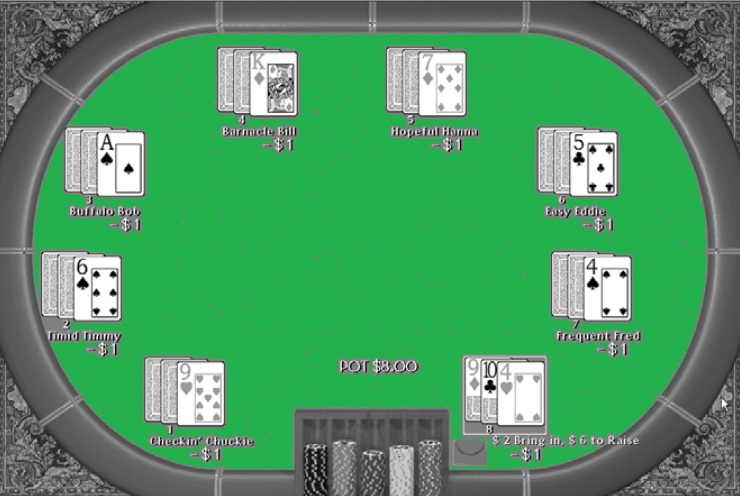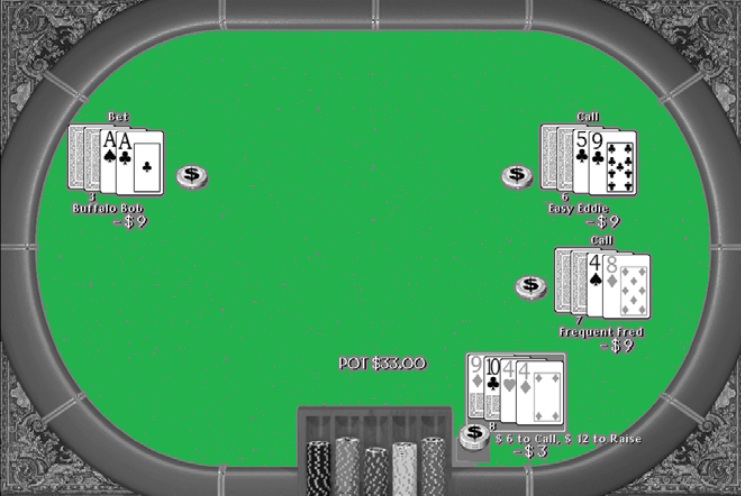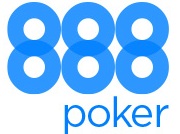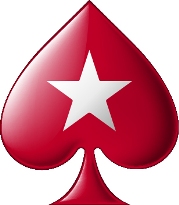In seven-card Stud poker, each player throws in an ante before the cards are dealt. If you play $2–$4 seven-card Stud, the ante is typically 25¢. Online you play seven-card Stud eighthanded, so at a full table the eight antes add up to $2, a small bet. After the antes are taken, each player receives three cards: two face-down and one face-up, as shown in the Figure below. We’ll indicate hidden cards by putting them in parentheses, so a hand with A♠ A♦ underneath and the K♦ showing would be written as (A♠ A♦) K♦.

You will recall that the player with the lowest card showing may not fold, but must instead make a forced bet, called the bring-in, which is usually of an amount less than the small bet in the game. For example, the bring-in might be $1 in a $2–$4 game. And, yes, this is an occasion where card suits might matter. If two players are tied for the lowest valued card, you break the tie based on suit ranks. The suits are ranked, from lowest to highest:
clubs, diamonds, hearts, and spades. If two players have Fours showing, but one of them is the 4♥ and the other is the 4♠, the player showing the 4♥ must make the bring-in bet.
The player who makes the bring-in bet can choose to “bring it in” for a full bet ($2 in a $2–$4 game) instead of the smaller bring-in amount. If you have the aforementioned (A♠ A♦) K♦, you might consider bringing it in for a full bet to try to win as much money as you can.
When a player posts the bring-in, the player to that player’s left may fold, call the bring-in, or complete the bet to the full amount for this first round. In a $2–$4 game, calling the bring-in would only cost $1, and the first raise would be to $2. Once it is $2 to go, players may raise two more times in $2 increments. After every player has either called all bets or folded, the dealer deals another face-up card to each of the remaining players, as shown:

highest hand showing gets to act first
This betting round is called fourth street because each player has four cards. On this betting round, and all subsequent rounds, the player with the best cards showing is first to act. Again, if there is a tie between the hands showing, such as if two players show an Ace and a King, the suit of the highest card determines who acts first.
On fourth street, all bets and raises are (again assuming a $2–$4 game) in $2 increments unless a player has a pair showing. If a player’s two upcards are paired, that player may choose to check, make a small bet of $2, or make a big bet of $4. Whichever amount that player chooses is the increment for the round. If the player with the pair checks, all bets and raises are of the smaller amount ($2 in this case).
After the action on fourth street is completed, the dealer gives each remaining player a fi fth face-up card. On this round, fi fth street, all bets and raises are of the larger amount. The same pattern holds true for sixth street. The seventh card, which is usually called the river and very occasionally seventh street, is dealt face down so that each player has four cards face up and three cards face down. After a last betting round, the players turn over their cards and make the best five-card hand possible out of their seven cards to determine a winner. In the case of a tie, the pot is split between the players with the best hands—suits don’t come into play.
What If We Run Out of Cards?
You might have done some quick math and determined that if all eight players stay in for the entire hand, thus requiring seven cards each, you’d need a 56-card deck. You can’t add cards to the game, but there is a procedure in place in case this unlikely event occurs. If there are fewer cards in the deck than are required to give all remaining players a fi nal face-down card, the dealer instead turns up a common card in the middle of the table. Like the board cards in flop games, such as Hold ’em, this common card is assumed to be in every player’s hand.










